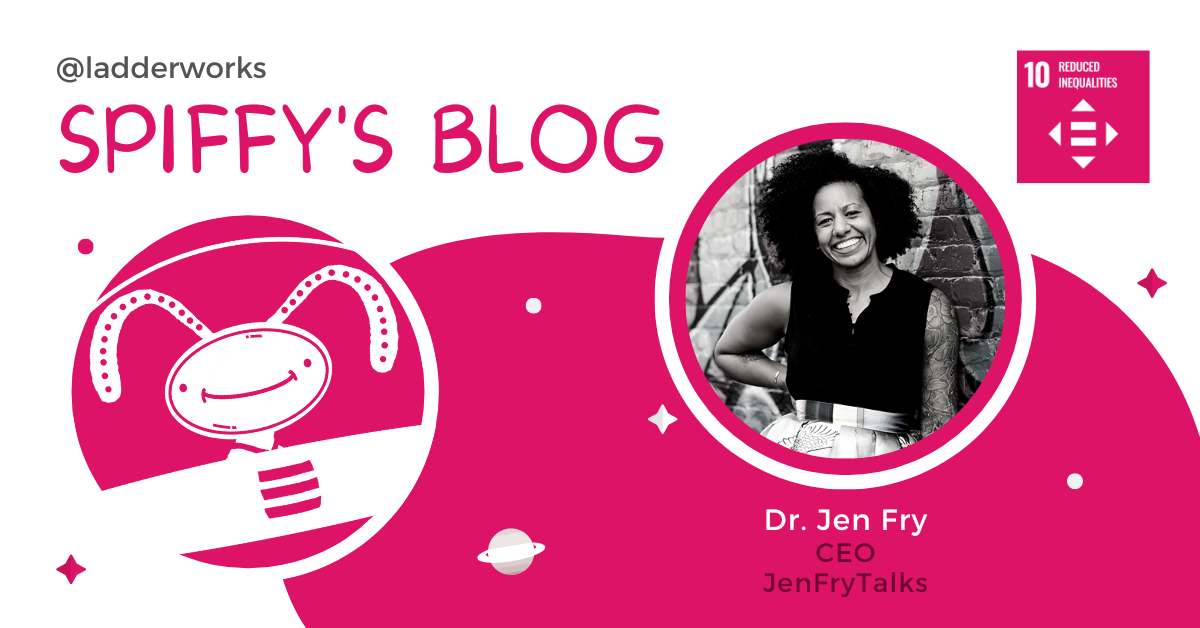Jen Fry: Using Conversation to Educate and Empower the Athletic World

Ladderworks is a publishing platform of diverse picture books and online curriculum with the mission to empower over a million kids to become social entrepreneurs. Our current series features interviews by our interplanetary journalist Spiffy with inspiring Social Entrepreneurs, Entrepreneurship Ecosystem Builders, and Changemakers who are advancing the UN SDGs.
Hey, friends! It's Spiffy, back again on Planet Earth with an eye on entrepreneurs making the world a more equitable place! I have a great interview to help get your week started on a positive note. Today, I’m excited to cruise around with Dr. Jen Fry, the founder and CEO of JenFryTalks. Are you ready to be inspired?
Spiffy: Thanks for joining me, Jen! Tell me, what challenge are you addressing?
Jen: Happy to be with you, Spiffy! My company addresses the lack of conversations between race and sports within college and professional athletics. We are a social justice education firm that uses conversation to educate and empower those within athletics through an anti-racist lens on issues of race, inclusion, intersectionality, diversity, and equity. We facilitate dialogue with small and large groups, athletic departments, athletic teams, staff, administrations, schools, affinity groups, identity groups, and much more. We use our anti-racist lens to advise on best practices that will create equitable searches, hiring, on-boarding practices, methods of retaining staff, retaining student-athletes, supporting student-athletes, staff and coaches, and community building.
Spiffy: Wow! That’s a big lift. What motivated you to tackle this challenge?
Jen: Initially, I started this work to help people from underserved backgrounds know that what they were going through is real and valid by having real and authentic conversations about the intersection of race and sports. Additionally, I wanted people with privileged identities to understand that their voices are critical to ending inequalities. When something is at stake, they must be willing to stand up even when they are nervous, timid, or scared. Unless people step up and speak out, we can't expect change. The reason I do this work is to give people the feeling that they can use their voices.
Spiffy: How are you working towards a more equitable world?
Jen: We at JenFryTalks strive to create a more equitable world by promoting conversation over content. The goal is to get people comfortable talking about themselves, engaging with their biases, their histories, and understanding who they are. To change the world around us, we must understand who we are. People are often reactive rather than proactive. In order to be proactive, you need to start with yourself and what you can do to improve yourself. Each of us is unique and complex. Each of us has a history that has shaped who we are.
Spiffy: Tell me about a recent organizational milestone or initiative. What impact does that make on your community or audience?
Jen: In our company, we have recently introduced a more in-depth discussion of conflict. The way we navigate creating an equitable world is affected by our relationship to conflict. Not only in personal relationships, but also in professional situations, we can benefit from thinking about how we handle conflict. It has been shown that this topic has a significant impact on people, because they consider how their family and friends have dealt with conflict and the lessons they have learned from it. By learning how you navigate conflict, you'll learn more about yourself and how you've been potentially harmful, either because you've not learned how to manage or because you have unresolved trauma manifesting itself in how you approach conflict.
Spiffy: Please share an experience when you faced failure and didn't give up. What did you learn from it?
Jen: My first attempt at doing a TEDx talk was a failure. I was disappointed that I wasn't selected. Using that failure as a learning experience, I considered ways to improve my idea's marketing. What do I need to change to be selected? After developing my pitch, I got selected for Duke TEDx in a program that was more suitable to my needs. My biggest lesson is that sometimes you need to tweak an idea to get it sold, because a “no” is just a “not yet.” It doesn't mean it's bad, it just means it needs a couple of tweaks to be perfect. Taking a “no” as a “not yet,” and not giving up, is what I learned.
Spiffy: Is there anything else you would love to tell our audience?
Jen: To make the world more equitable means you will be involved in some type of conflict. Whether it is telling a loved one that what they said is wrong, or standing up to your supervisor by holding them accountable for what they said or did.
Spiffy: Thanks for speaking with me today, Jen—it’s been an honor!
Dr. Jen Fry is the founder and CEO of JenFryTalks LLC which is a social justice education firm that uses conversation to educate and empower those within athletics through an anti-racist lens on issues of race, inclusion, intersectionality, diversity, and equity. We facilitate dialogue with small and large groups, athletic departments, athletic teams, staff, administrations, schools, and much more. Jen completed her Ph.D. in Geography from Michigan State University. (Nominated by the Ladderworks team. First published on the Ladderworks website on September 19, 2022.)
© 2022 Ladderworks LLC. Edited by George Romar. Spiffy’s illustration by Shreyas Navare. For the Ladderworks digital curriculum to help K-3 kids advance the UN SDGs, visit Spiffy's Launchpad: Creative Entrepreneurship Workshops for K-3 Kids and their caregivers here.


